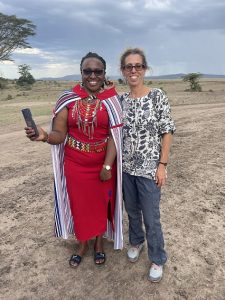
- This event has passed.
IBS Speaker Series: Mara Goldman
November 14, 2022 @ 12:00 pm - 1:00 pm

Join in person or via Zoom, email ibs-contact@colorado.edu for the password.
*Light lunch served at 11:45, please RSVP.
Title: Covid-19 and Conservation/Tourism: Lessons learned from dryland communities in East and Southern Africa.
With: Joana Roque de Pinho, University Institute of Lisbon; Angela Kronenburg García, University of Padua; Eduard Gargallo, University Institute of Lisbon; Jona Heita, University of Namibia, Khomasdal
Abstract: As has been well documented, the Covid-19 pandemic unleashed unprecedented changes across the planet as related to both the disease itself and the mechanisms put in place to minimize its spread. In this talk, I share data from a collaborative project supported both by a CUPC and Hazard Center Converge Grant that looked specifically at impacts on dryland communities in East and Southern Africa as related to community-based-conservation and tourism. We partnered with local co-researchers to conduct research during the pandemic in conservation landscapes in Namibia, Kenya, and Tanzania; in communities where tourism and conservation have been adopted as market-based solutions to social and environmental vulnerabilities. The COVID-19 pandemic resulted in the cessation of international tourism and the suspension of most employment related to community-based conservation in the region. Our research highlights three important findings and a provocative challenge. First, we show the dangers of promoting tourism as the catchall solution to combat rural poverty while simultaneously promoting conservation, with possible outcomes detrimental to both communities and conservation. Second, we show the highly uneven ways in which the impacts of COVID-19 and the measures used to contain it play out in rural communities. And third, our research illustrates the resilience of dryland communities and their ability to rebuild livelihoods while experimenting with possible futures. This leads to the question of how such research can help challenge existing conservation/tourism models and make space for new models and conservation futures.

Bio: Mara Goldman is an Associate Professor in the Department of Geography, and Director for the Environment and Society Program at the Institute for Behavioral Sciences, at the University of Colorado-Boulder. She is also an affiliate faculty in the Gender and Women’s Studies Program and the Center for Native American and Indigenous Studies. She received her PhD in 2006 from the University of Wisconsin-Madison (geography) and holds an MS in Conservation Biology and Sustainable Development (UW-Madison, 2001) as well as an MA in Geography from the University of California Los Angeles (1998). She was a post-doctoral fellow at the International Livestock Research Institute (ILRI), in Nairobi, where she conducted research on “Communication and the Politics of Participation in Pastoral Societies,” among Maasai communities in southern Kenya and northern Tanzania.
Dr. Goldman’s research is situated in human-environment geography and can best be described as political ecology with specific attention to knowledge politics as related to conservation and development interventions. She draws on deep ethnographic engagements, political ecology and science studies scholarship, and feminist approaches to research and theory. She has worked for over two decades in East Africa, specifically with pastoral/agro-pastoral Maasai communities in Tanzania and Kenya and has recently begun to expand her research to include comparative work with forest-dwelling tribal communities in India. Her book, Narrating Nature: Wildlife conservation and Maasai ways of knowing, was published by the University Arizona Press, Critical Green Engagements Series in 2020. She is also co-editor (with P. Nadasdy, and M.D. Turner), of Knowing Nature: Conversations at the intersection of political ecology and science studies. Chicago: University of Chicago Press, 2011, and has also published widely in Geography and conservation and development journals.
Current projects include a large-scale collaborative research project with scholars and co-researchers across Europe, Asia, and Africa on the effects of Covid-19 on dryland communities broadly, and on community conservation efforts. She is also involved in collaborative conversations on what it means to decolonize conservation and to address gender as a factor in biodiversity conservation efforts, globally and within indigenous communities in East Africa and India.
